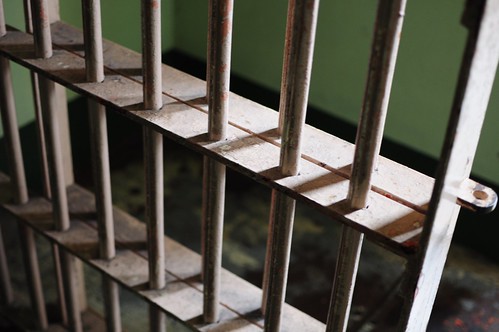
Tuesday, more than 350,000 Virginians (about 7 percent of the voting population) did not get to choose their new governor. As MSNBC‘s Ari Melber pointed out in an important piece this week, the problem in this case is not voter ID or low turnout, but rather an “often invisible barrier to voting” that affects millions more across the country.
Nationally, five million Americans cannot vote because they have criminal records. “If voting rights were restored to those former inmates, about 4.3 million more Americans would be able to vote,” Melber wrote. “That is over three times margin of victory in the last House midterm elections.”
Voting rights restoration varies from state-to-state, ranging from permanent disenfranchisement (unless pardoned by a governor) to automatic restoration upon release. (Vermont and Maine are the only states that do not disenfranchise people.)
“The states that have the harshest policies just happen to be those states with legacies of slavery, segregation, discrimination, voter suppression and the denial of the right to vote,” National Urban League President Marc Morial told Melber. According to the MSNBC report, laws in just six southern states disenfranchise over half of the ex-felons barred from voting across the nation.
Virginia, for example, “continues to have one of the harshest rights restoration systems in the country, even though local organizers had a major victory in May 2013, which allows the Governor to automatically restore the rights of people with ‘non-violent’ convictions,” according to advocacy group, Advancement Project. “The system…remains punitive, unfair and hard. Along with the many other barriers faced by returning citizens, it denies their citizenship, dignity, and humanity.”
While states like Virginia are slowly moving toward reducing the barriers to voting, members of Congress have proposed federal policies to restore voting rights upon release from incarceration. The Democracy Restoration Act, first introduced in 2009, would restore the voting rights of any ex-offender who is released from prison. This bill has been reintroduced since 2009. In 2013, the Voter Empowerment Act, an omnibus election bill introduced by Rep. John Lewis and others, would restore voting rights to ex-felons in federal elections, among other provisions. The bill is currently pending.
Voting rights restoration not only contributes to the ex-offender’s rehabilitation process, but also reduces the harmful impact that disenfranchisement laws have on low-income and minority communities (who are underrepresented in the electorate, but over-represented in the criminal justice system). A nationwide policy on restoring voting rights is yet another key to combatting voter suppression and ensuring all Americans have a voice in our democracy.
Learn more about disenfranchisement laws at The Sentencing Project. Find tools to restore voting rights in Virginia at Advancement Project.
Photo by kitsu via Creative Commons.